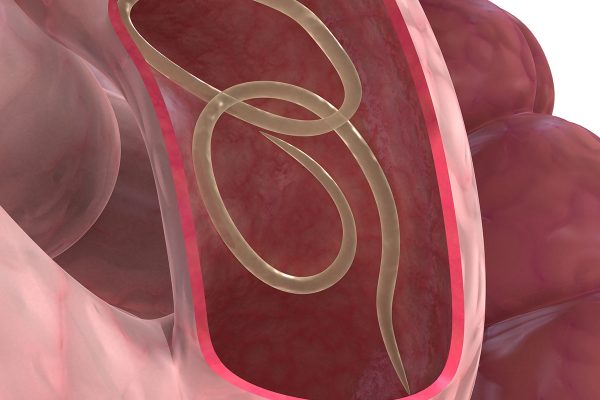One of the most vulnerable stages over the life of a dog is when it is only a puppy. This extreme sensitivity also shows up when dealing with internal parasites. To keep your puppy protected from them, it is important to know which of these parasites are the most common and dangerous, especially during the first months of your puppy’s life. Here we’ll tell you a bit more about these parasites:
Ascaris
These are the most common roundworms. In fact, puppies are already born infected by ascaris, as larvae can pass from mother to puppy through the placenta and, once the puppy is born, they continue to reach the puppy through its mother’s milk. It is therefore essential to deworm the mother during the period of gestation (to reduce the number of parasites reaching the puppy) and to deworm your puppy for the first time once it is 15 days old. At other stages of their lives, the main source of infection for puppies and adult animals is soil, particularly in parks and squares.
Ancylostomas
These are another type of roundworms, whose larvae reach the puppy through its mother’s milk. Known as “hookworms,” they firmly attach themselves to the walls of the intestine, hurting it and causing constant hemorrhages that can be more or less severe depending on the number of parasites and the puppy’s general condition. Ancylostomas are the cause of major anemias, which can place your puppy’s life at risk, especially if co-occurring with other diseases. Ancylostomas enter the body mainly through the skin, so both puppies and adults must be dewormed frequently to reduce the risk of this parasitic disease.
Keep in mind that both ascaris and ancylostomas are causative agents of disease in humans (zoonoses) such as visceral larva migrans and ocular larva migrans, caused by various species of ascaris, and cutaneous larva migrans, caused by ancylostomas. Taking care of your puppy is taking care of your whole family.
Dipylidium
It belongs to a group of parasites known as flatworms or tapeworms. While they are not as common during the first two months of your puppy’s life, they do become more common as it grows older. In fact, it is the most common species of flatworm in dogs and cats, reaching them through fleas. When the parasite has settled, adult parasites can often be seen around the tail, resembling “rice grains,” and it is usual for the animal to rub this area against the ground. To eradicate them, it is not enough to internally deworm your dog—we must also eliminate its fleas. Dypilidiasis is also a zoonotic disease common in children and we can prevent it by taking care of our pets.
Round- and flatworm parasites are always there. In fact, most of the squares and public spaces we know are contaminated with these parasites. Thus, it is best to preventively deworm your pet every month, rather than waiting for your puppy to get sick. It should be noted that a properly dewormed puppy will respond better to any vaccines given to it, as its immune system will not be “distracted” by internal parasites.
Giardias
These are unicellular parasites, so microscopic that even adult giardias are invisible. Puppies are usually infected through contaminated water or food, although contagion can also occur during their first weeks of life if their mother is parasitized or lives in an environment harboring the parasite (breeding facilities, kennels, daycare centers, etc.). Giardias are the cause of strong diarrhea, which increases in stressful situations and leads to severe weight loss and malnutrition in puppies. Giardiasis is one of the most common intestinal parasite diseases in humans, so it is also considered a zoonosis.
Coccidia
Like the others above, these are exceedingly small parasites invisible to the naked eye. Puppies become infected at an early age by living with infected mothers and in environments that harbor the parasite. Coccidia cause bloody diarrhea, putting the puppy’s life at risk, so urgent action is vital.
It is important to deworm puppies to eliminate giardias and/or coccidia only if we are certain that any or both of them are present. For this, a specific stool analysis is required. The unnecessary use of anti-parasitics is to be avoided, as these parasites quickly develop drug resistance. It is also crucial to combine treating the puppy with deworming the mother and good hygiene practices in order to reduce the burden on the environment.
Always talk to your vet to properly deworm your pet and to protect your family as a whole.

